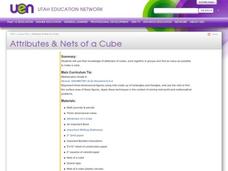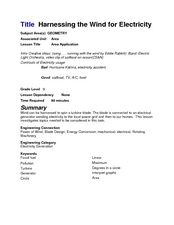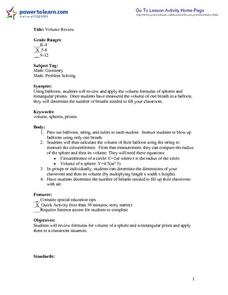Curated OER
Cones, Cylinders, Spheres
Students classify polygons by name and shape. In this geometry instructional activity, students identify the lateral surface of each conic. They differentiate between cones, cylinders and spheres.
Curated OER
Equations Worksheet
In this math worksheet, students create and solve equations with the help of Algebra Tiles. Then they apply formulas for geometry to find the perimeter of a polygon.
Curated OER
Square Graphs
Students identify the different properties of quadrilaterals. In this geometry-lesson, students define parallel sides and diagonals of polygons as they compare to a quadrilateral. They identify the methods to find the angles in a...
Curated OER
Geoboard Squares
Students create squares of different sizes on a geoboard. They find and describe a pattern. Students use the pattern to determine the number of squares possible on a 10-by-10 geoboard. They create squares with a horizontal base (and...
Curated OER
Attributes & Nets of a Cube
Third graders engage in a lesson that focuses on the attributes and forming of a cube. They construct a cube using different combinations while comparing a square with only two-dimensions. Students fold paper while following the...
Curated OER
Number & Operations
In this number and operations worksheet, students solve and complete 3 different sections of one problem that uses the Pythagorean theorem to solve. They use the model illustrated to determine the meaning of the Pythagorean theorem....
Curated OER
Eye From the Sky
Students are introduced to the concept of aerial perspective and scale. Students will use satellite technology to view their neighborhoods and sketch the area surrounding their schools. They will take part in a neighborhood walk to view...
Curated OER
Harnessing the Wind for Electricity
Ninth graders explain how wind can produce electricity. In this geometry lesson, 9th graders construct their own pin wheel turbine and calculate its power. They discuss the pros and cons of using wind generator.
Curated OER
TAAS Attack Daily Upkeep 2 4th Grade
In this elementary math worksheet, 4th graders practice solving problems for reviewing the concepts of number sentences, numeration, and geometry.
Curated OER
You Can Count on Squares!
Fourth graders engage in and explore to develop mathematical, specifically algebraic, ideas. Although the tasks are built around measurement, they are algebraic to the extent that they require 'formulae' to be derived form the geometric...
Curated OER
Pythagorean Theorem by Graphic Manipulation
There are many different ways to show a proof of the Pythagorean Theorem. Here is a nice hands-on paper cutting activity that shows a graphic representation. You can even challenge your young Pythagoreans to come up with their own...
Alabama Learning Exchange
What You Know About the Bermuda Triangle?
Get lost in the classifications. Using the backdrop of the Bermuda Triangle, pupils classify it by angle and side measures. They also learn information about the triangle and its history.
Noyce Foundation
Which is Bigger?
To take the longest path, go around—or was that go over? Class members measure scale drawings of a cylindrical vase to find the height and diameter. They calculate the actual height and circumference and determine which is larger.
Old Dominion University
Introduction to Calculus
This heady calculus text covers the subjects of differential and integral calculus with rigorous detail, culminating in a chapter of physics and engineering applications. A particular emphasis on classic proof meshes with modern graphs,...
Alabama Learning Exchange
"I Saw the Sine"
Discover trigonometric ratios that complement each other. Using two videos, the lesson introduces the trigonometric ratios. The class discovers the relationship between the sine and cosine of complementary angles.
Curated OER
Measuring Angles
Third graders describe an amount of turn from a particular position to another using the 'circular' benchmarks of 0, ++, ++, ++, and full turn. Estimation language such as 'just about', 'between', 'not quite', 'just over', and similar...
Curated OER
Ecology - Biodiversity Lab
Studnents examine the degree of biodiversity that exists in one's everyday environment, in order to develop an understanding of how scientists classify organisms and to explain why biodiversity is important for living things.
Curated OER
Volume Review
Learners investigate the concepts of volume for rectangular prisms and spheres. They measure the volume of one balloon and then consider how many breaths it would take to fill the room with balloons. The rectangular prism being measured...
Curated OER
Shape Hunt
Explore the world of shapes! After free tangram exploration and pair share time, learners describe various patterns and shapes in both the natural and designed world. They investigate the use of tangrams to create patterns and shapes.
Curated OER
Exploring Infinite Series through Baravelle Spirals
Students are introduced to the concept of convergent infinite series using a recursive geometric construction. They explore the concept of a convergent infinite series using partial sums. Students use formal calculations, visualizations,...
Curated OER
Perimeter
Young scholars examine the concept of perimeter. Students calculate the perimeter of a random shape on a grid. Young scholars develop a better understanding of the concept of perimeter. Students calculate the perimeter of shapes.
Curated OER
Nature's Polyhedrons
Students are introduced to polyhedrons through using straw models to explore geometric solids and constructing Christmas tree ornaments using Epsom salt crystals. Students will view interactive videos and investigate and retrieve...
Curated OER
An Introduction to Quadrilaterals
Students explore different types of quadrilaterals. Students define the terminology used with quadrilaterals. They create particular quadrilaterals based on specific characteristics of the quadrilaterals using an online tool.
Curated OER
It Counts
Students assign numbers to describe objects. In this number activity, students assign numbers to objects and compare more, less, and equal values. They write down descriptions of plants including the number of leaves and height of the...

























